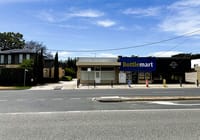
Dexus takes heart from rate cut
Ross Du Vernet who leads Dexus, one of the country’s biggest listed property landlords, says Tuesday’s much-anticipated rate will be well-received in a sector that has borne the brunt of high costs and falling valuations.
Even before the Reserve Bank board delivered its first cut in more than four years, signs of a turnaround were already apparent in Dexus’ first half 2025 result. It swung to a modest $10.3 million profit after factoring in lower valuation losses on its properties over the period.

A year earlier the landlord and fund manager had posted a net interim loss of $597.2 million, a result that was largely due to writedowns in asset values.
This time around the pace of devaluations is clearly easing, resulting in just a 1.6 per cent total decrease on book values for Dexus’ directly held portfolio of mostly office and some logistics assets. It manages a more diverse range of commercial properties: from office towers, malls and warehouses to healthcare, infrastructure and alternatives.
Mr Du Vernet said the rate cut – of 25 basis points taking the cash rate to 4.1 per cent – would be positive for both investors and for fund raising. Of the $53.4 billion in Dexus’ total funds under management, nearly $40 billion is third-party capital.
“A cut is certainly going to signal a change in the cycle,” Du Vernet told The Australian Financial Review. “Institutions and pension funds are very cautious by their nature. Hard evidence that the rate cycle has changed is far more important than economists’ predictions.
“It’s going to be important to the psychology of the market.”
Hardest hit in the disruption to commercial real estate has been the office sector. The embrace of flexible working has added to uncertainty about demand and, combined with high debt costs, has sent asset values tumbling over the past two years.
While Dexus is rapidly diversifying its portfolio, office remains its biggest single allocation at more than $20 billion. For its interim result, a modest 1.4 per cent tick-up in the valuations of industrial assets mitigated the 2.6 per cent drop in office values.
But the end of that downward cycle is nearing, according to Du Vernet, particularly for high quality office towers in sought-after locations. There is a flight to quality on the tenants side, he said. However, secondary buildings will suffer some pain, though. Overall, leasing incentives are falling and the take-up of space in Sydney at least is increasing.
“We’re seeing it play out in the numbers,” Du Vernet said. “All the data is pointing to a recovery and potentially a reasonably fast recovery in the office market, particularly for those better quality assets in those gateway cities.
“Melbourne is a slightly different story – it’s a real challenge.”
Adding to the green shoots vibe for the office sector is the push from some larger employers for their staff to spend more time in the workplace, through stricter office mandates. Du Vernet said business were leaning into “the productivity benefits of bringing people back to the office in a more meaningful way”.
“And they’re prepared to lean a little bit harder in the current environment,” he said.
Under Du Vernet’s hand, Dexus is pushing further into funds management, having bulked up that business by taking over the bulk of AMP Capital’s platform three years ago.
The creation of new funds is being considered, but Dexus must also manage more than $2.5 billion in redemption requests from funds across it platform, including at one of its infrastructure funds which has been frozen.
“At this point in the cycle we expect clients to want to cycle capital through products and strategies,” Du Vernet said.
High debt costs took a toll on Dexus’ earnings, as assessed through the industry standard of funds from operations, which fell 7.4 per cent to $337.8 million. Distributions dropped to 19¢ per share, down from 26.7¢ a year earlier. Dexus has reaffirmed its full-year guidance for distributions of 37¢.











